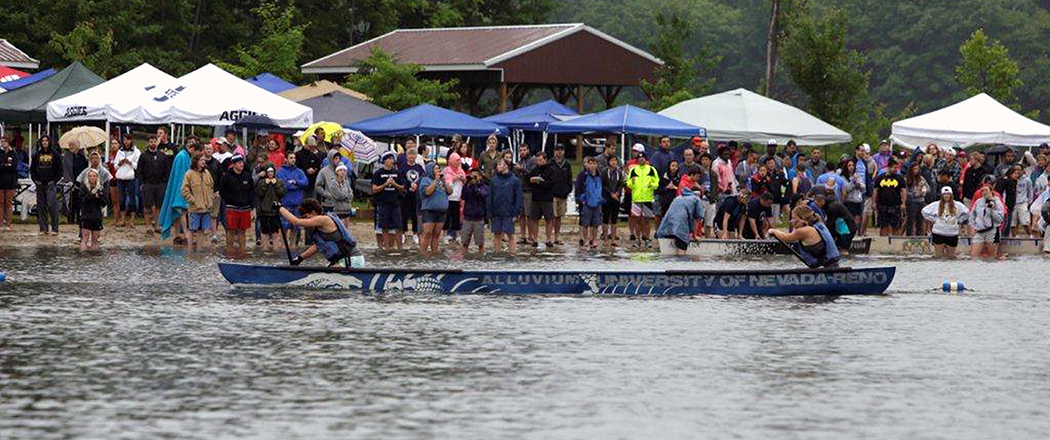The University of Nevada, Reno concrete canoe competition team won first place in the national competition Saturday in Pennsylvania beating 22 other top universities from around the country. Congratulations came pouring in as the word spread like wildfire.
Praise came from regents of the Nevada System of Higher Education, top administrators at the University, students, former team members and the community.
"Congratulations to the whole team and coaches," University President Marc Johnson said. "You all have represented your university well."
"Congratulations to the entire team," University Provost Kevin Carman said. "This is a wonderful tradition of excellence in which we all take great pride."
College of Engineering Dean Manos Maragakis elaborated on the team's accomplishment.
"I am thrilled and very proud that our concrete canoe team, our dream team, has won the national championship," Maragakis said. "They stood above all other teams in a very competitive tournament. They did it with hard, focused work, high technical skills, well-coordinated collaboration, integrity and an unparalleled competitive spirit. This College is committed to excellence and a solid national reputation. Today our own students showed us the way. Congratulations to all."
The team of 16 civil engineering students carry on the College of Engineering's winning tradition by making this the University's second national win, the ninth year in a row to earn a national appearance and having now placed in the top five in every appearance since 2007. The team put their academic and paddling skills to the test in designing, building and racing this year's 170-pound, 21-foot 8-inch long concrete canoe, named Alluvium - and with an ichthyosaur painted on its side.
"There were a lot of amazing canoes this year, and the competition was very high, but they stood above the rest," the team's faculty advisor and civil engineering professor David Sanders said. "They represented the University extremely well, the whole room stood up when they were announced as winners.
Teams competed for the highest score through a composite of five canoe races, canoe aesthetics, a technical paper and an oral presentation.
"They did incredible in the races," Sanders said. "They were great overall - presentation, report and final product. Several teams wanted to take our canoe out for spin after the races. I am very proud of them. Hats off to the whole team. Austin Martin and Kristin Kramer, as project managers, did an amazing job and, as is their style, took time to give credit to every team member individually when it was over."
Some of the competitors' canoes weighed under 150 pounds - with one a reportedly, amazingly light 110 pounds - and some weighed as much as 350 pounds.
The 22 universities in this year's competition represented their own regional conferences, with about 350 universities nationwide (and some from Canada and Mexico) taking part in the American Society of Civil engineer's annual competition.
Engineering students from 18 other conferences around the country competed in nationals, including Cornell University, Clemson University, Louisiana Tech University, University of Wisconsin-Madison, and Texas A&M University.
Second place in the competition was California Polytechnic State University, San Luis Obispo, California; third place was Université Laval in Montreal; fourth place was Utah State University and in fifth place was University of Wisconsin - Madison.
The competition's goal is to give civil engineering students hands-on experience working with concrete - one of the world's most common building materials - and to increase public awareness about civil engineering as a dynamic and innovative field.












